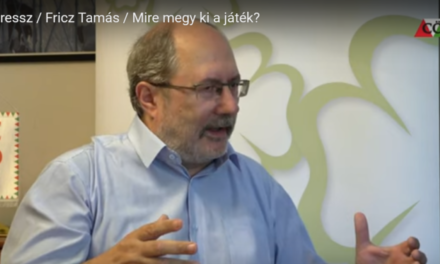However, there is no time for misunderstandings, there is no room for exaggerated steps and hostility toward each other. Written by László Földi.
Political literacy is a term not often used on a daily basis, but we experience its content and its consequences all the more. Political ignorance, on the other hand, does not refer to a lexical deficiency, since someone can be theoretically prepared if he otherwise represents disastrous solutions in political decisions.
Along with public opinion, the majority of politicians also tend to confuse the relationship between political strategy and tactics, when tactics are placed before strategy, mainly for individual or marginal reasons. And this always leads to a dead end, or - in an acute historical situation - to the development of disasters.
It cannot be emphasized enough that the strategy is formulated in a concise form, a clear and long-term goal to be achieved, which is built up by tactical solutions, while they cannot cross the strategic direction.
They can't even if the tactical solutions sometimes involve extreme actions depending on the current circumstances.
On the part of the electorate, it is an idealized – albeit a legitimate expectation – that actors in public life have a high level of political education. At the same time, the idealism to be supported cannot be fulfilled in the political arena. Nowadays, in a moral sense, unfortunately, all that can be expected from those in power is that they try to serve the interests of the majority of society in their actions beyond their words.
In earlier centuries, political responsibility was more present and even the morality of the given word emerged, but since then many things have been "erased" by the new world.
At the same time, the most important strategic question of our time is: war or peace?
All other topics are on a tactical level in comparison, be they economic, cultural or even social oriented, because everything is assigned a subordinate role compared to the strategic challenge of "war or peace". This is not a question of insight, but of acceptance! If we approach it this way, it can be seen that the political literacy of the intellectual elite in Europe is at a low level compared to the challenges. Support for peace in the case of parties in government is insignificant. Yet, their cursing is carried out on a daily basis by the others, the war supporters.
All this happens in the midst of a life situation when the XXI. The real strategic question of the 20th century sounds much more like this: peace or peace?
War is meaningless even in rhetorical form, if by war we mean a clash between superpowers with superweapons. According to scientific calculations, a collision of this type would mean the lives of five billion people and the destruction of 99 percent of Europe almost immediately. In other words, the question arises, why are we talking about a world war at all, when the formula is so simple?
Even the apparent peace of our century produces plenty of internal and external conflict, between man and man, between economic interest and competition, just as political parties and forces set up conflict zones similar to trenches every day. But at least the internal wars of apparent peace have tactical value and are not doomsday scenarios, even if the lack of peace is a curse on humanity in general.
What caused the above sentences to be forced out of the author of the article is specifically of a domestic political nature.
Since the emotions of Hungarian society are strongly influenced by the events culminating in the international arena from the point of view of political education, we must be satisfied with the strategic value judgment of the Hungarian government, which means the issue of war and peace. At the same time, in matters of domestic politics, the public increasingly expresses a critical position, which would be fine if, at the same time, the foreign policy strategy represented by the Hungarian government was not attacked even by people who otherwise seem to be fair and politically literate.
It can be predicted that in the coming months the street will also come to life, in a political sense it will become even more lively.
Movements, events, demonstrations and resolutions can follow each other. Important and less important sentences will be spoken, encouraging those looking for hope, showing the real or perceived way out of the horror taking place in the international space. The critical voices try to influence the public's consciousness from different basic positions.
One set of opinions comes from those who approach problems with fearful good faith, but carelessly swapping strategic and tactical goals, which can cause just as much damage as the real enemies of our country. For example, they will demand that Hungary withdraw from NATO, which, according to human calculations, would immediately lead to our occupation by NATO soldiers. The Brussels reason for the occupation would be:
"The Orbán government is pro-Russian, and its withdrawal from the military alliance clearly proves its dictatorial nature."
And the international public would listen deeply, just as it did in 1956.
The other critical direction will be the narrative supported/financed by an external economic force that openly strives for internal political tension. In other words, whatever the current government does, it can count on even more intense criticism from both directions.
How can political literacy be developed in such circumstances?
Is it even possible to navigate between the rhetoric of good faith and deceit, while in principle there will be good-sounding voices coming from both directions? It is not possible, but it is mandatory to understand the essence:
"Make sense of common sense and believe the word of humanity".
So the formula is simpler than we think. Political primacy was relegated to the background, replaced by the social interest. It is not the color of the flags that matters, but the direction and strength of the wind. And we, the silent majority, must sharpen our greatest virtue. There is no time for misunderstandings, no room for exaggerated steps and hostility towards each other. Otherwise, five billion of us, together with 99 percent of the European continent, will be destroyed forever.
And we don't want that!
Featured image source: Mandiner













